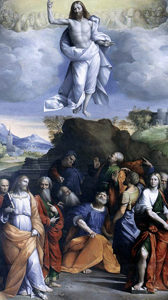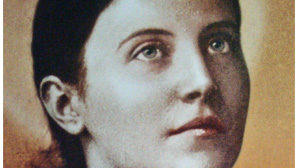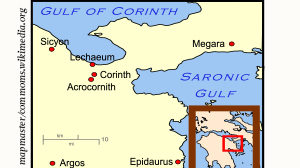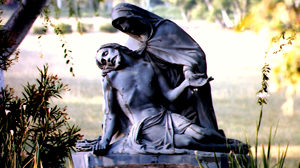Acts 22:30; 23:6-11
John 17:20-26
Reflection:
One of the wonders of the quilt-making craft is how scores, possibly hundreds, of quite differently hued and shaped pieces of cloth can be brought together into a bed-sized quilt, so that, seen covering a bed, it becomes a thing of artistic beauty. At first sight, it would have seemed impossible to work with such diverse pieces of materials, and bring forth symmetry and harmony: harmony out of diversity—indeed, harmony by way of diversity.
When Jesus completed His mission on earth, suffering death on the cross as a disgraced criminal, then rising majestically from the dead, and returning in glory to His Father in heaven, He was leaving behind Him, despite three intense years of formation and instruction, a motley group of followers none of whom demonstrated any significant signs of leadership or organizational and inspirational skills. They resembled so many different pieces of cloth as they went their way preaching the gospel, across the borders of disparate countries, without the benefit of cell phones or any other mode of communication with one another, likely never reassembling together again, in the remaining years of their lives. And yet, they offered a cohesive pattern of religious faith in the person of the Lord Jesus, comparable to the way a quilt acquires the status of an artistic masterpiece, from so many distinct pieces of cloth. How do we account for this?
Today’s gospel contains the secret of this wonder: it is embedded in Jesus’ final prayer for His twelve closest followers: a prayer for harmony and unity. This was a prayer of petition for a very unlikely outcome, that harmony and unity would prevail among the twelve, and with Jesus Himself, despite His absence from them as He returns to His Heavenly Father. His prayer for their harmony and unity amid so many factors militating against any success in preaching the Good News, such as their disarray, incompetence and ignorance, seems as unlikely to succeed as the multiple squares of multi-colored pieces of cloth coming together into a charming bedspread of beauty. But Jesus had confidence in the success awaiting His apostles, so He confidently departed their company to face His imminent arrest and crucifixion.
Now, granted the efficacy of Jesus’ prayer that harmony and peace would prevail among them, we note a very different tactic resorted to years later, by the versatile and clever Paul, the Apostle, while the other apostles, during these years following Jesus’ Ascension into heaven, spread out across the eastern part of the Mediterranean basin, exhibiting the harmony of purpose and achievement, prayed for by Jesus at the Last Supper. But Paul, for his part, was doing something equally marvelous, in his own way. Today’s reading presents a coy and clever Paul, arraigned before the Roman authorities for the disrupture of the public order he had caused, at least within the Jewish community, by preaching the saving mystery of the dead and risen Jesus. On this occasion, the clever apostle, anticipating the disharmony and disagreement among segments of the Jews assembled against him if he introduced the topic of Jesus’ resurrection from the dead, instigating a furious argument among them, which worked to his own advantage, since he knew the Roman authorities would have to turn their attention away from him in order to restore law and order among the combative factions of Pharisees and Sadducees, arguing over this very topic. This is exactly what happened. Paul made clever use of disharmony among his opponents to secure his escape from them so he could carry on his preaching ministry with his customary success.
And so today’s scripture shows both harmony and disharmony working in equally effective ways among the apostles, in their efforts at advancing the message of Jesus. And the same factors play out in our contemporary church as we recall today the martyrdom of contemporary (1937) Christians such as SS. Christopher Magallanes and his companions for their support of a Mexican Christian protest movement against an anti-Catholic government, or as we celebrate this Saturday (May 23rd), when Pope Francis’ beatifies Archbishop Oscar Romero, assassinated in El Salvador (1980) for his opposition to governmental persecution of the church because of its support of the poor and disenfranchised—a step Pope St. John Paul II earlier on hesitated to take, fearing it to be more a contentious political issue than a religious one.
Both harmony and disharmony, each in its own way, work themselves out, each in their own way, can promote and advance the gospel message about Jesus Christ. So, different ways of presenting the gospel can prove as effective as different patterns of quilt material coming together into a bedspread pleasing to the eye.
Fr. Sebastian MacDonald, C.P. is a member of the Passionist formation community at Catholic Theological Union, Chicago.







